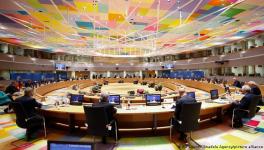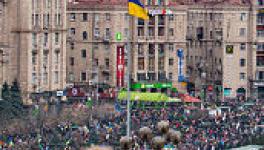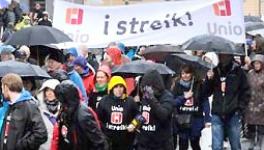Palestine's Norwegians
Sitting on an Amtrak train from New Haven to Washington, DC on Friday, I was enjoying my thriller, Kjell Ola Dahl's The Man in the Window. Dahl's police procedural novels are set in Oslo, Norway, where the remarkable detectives Frank Frølich and Gunnarstranda confront the heart of modern evil: Property is often the hub of the conflict, but so too is the ineluctable history of Nazism and the Second World War. Abrave history of pacifism, partly contained in the Norwegian Labour Party, kept the country out of World War I. Its ports and a direct route to Swedish iron ore made it irresistible to the Nazis, whose forces invaded a largely unprotected Norway in 1940.
To run the country, the Nazis turned to the leader of the Norwegian Nasjonal Samling, the local Nazi Party, Vidkun Quisling (from whom we get the noun for traitor). It was the Quisling era (replete with concentration camps) that planted the tree of Nazism in Norwegian soil. The remnants of Scandinavian Nazis regrouped after World War II, but they remained small and obscure.
Scandinavian social democracy stumbled by the 1980s as the economic benefits of its welfare state were reduced. Anti-immigrant and anti-left sentiment grew amongst sections of the dispossessed working-class and middle-class, whose more militant element formed the Skinheads. They were the rump of the revival of neo-Nazism in the 1990s. It was as a consequence of this emergence that in 1995 the Swedish left created Expo, the anti-racist magazine edited by Stieg Larsson. It is also the reason why Scandinavian police procedural novels and thrillers are so very good (from Henning Mankell to Larsson to Jo Nesbø): they produce superb artfrom the hypocritical bourgeois denial of the existence of Nazism, and how it is the soft-Right of the "moderates" that tolerates and encourages the far-Right.
In Norway, the Skinheads morphed into groups such as the Boot Boys, who spent their time trolling the streets seeking out those who appear to be migrants. In 2002, three of the Boot Boys killed a fifteen year old, Benjamin Hermansen. When this incident occurred, the newspaper Dagsavisen wrote, "This must open the eyes of the authorities and all those who don't want to acknowledge the existence of Nazism and racism in Norway." On February 1, 2002, 40,000 of the 4.4 million Norwegians gathered in Oslo to demonstrate against this murder. The crowds included Prime Minister Jens Stoltenberg and Crown Prince Haakon. The Centre Against Racism in Oslo notes that since the late 1980s, there have been almost two thousand incidents of racism in the country, some of it enhanced by the rhetoric of the so-called Progress Party and of course the Nazi sects.
My I-Phone pinged, and news came of the bombing in Oslo and the massacre on Utøya Island. The dead at the latter were from the Workers' Youth League (AUF), linked to the Norwegian Labour Party, but with roots in the Communist and Socialist movements of the 1920s. The current Prime Minister of Norway, Jens Stoltenberg, was once leader of the AUF. The initial reaction in the West was that the attacks had been conducted by Muslim jihadis. This has become a habit – after the 1995 bombing in Oklahoma City, CBS's Jim Stewart said, "The betting here is on Middle East terrorists." Of course this was more Mid-West than Mid-East, but there was no apology from the media to the Muslims in America.
The first reports from the New York Times suggested that the Oslo bomber was a jihadi (Professor Will McCants tweeted that the perp was Ansar al-Jihad al-Alami, something repeated by the Times, who later said that "the group was previously unknown and might not even exist"). When the fog of Islamaphobia partly cleared, and the Norwegian police was allowed its moment, they revealed that the actual killer was a Nazi, Anders Behring Breivik, who could very well have been a character from a Dahl novel.
A few hours later, Breivik's manifesto began to appear on various websites. Here Breivik fulminated against "Marxist-Multiculturalists." This has become a familiar refrain among the defenders of Fortress Europe: they want to secure their continent from the re-conquest of the Moors. The tendency is hateful toward immigrants and Islam. But these are not marginal socio-paths. Their views flow down the center of the stream of European conservatism. InOctober of last year, German Chancellor Angela Merkel said that multiculturalism "has utterly failed." Immigrants needed to be force-marched into German culture, and if this is not possible, they should not be allowed to enter the country.
In February of this year, Britain's Cameron and France's Sarkozy followed Merkel's lead. Cameron blamed the "doctrine of state multiculturalism" for encouraging migrants to "live separate lives, apart from each other and the mainstream." France's Sarkozy gave a bitter speech against multiculturalism and then told the MPs of his "Union for a Popular Movement" party that he wanted laws to rein in Islam. Electorally, Sarkozy wanted to outflank the increased popularity of Martine Le Pen's National Front. "We had a debate on the burqa," he said, "now we should have a debate on street preachers." This is less a debate and more a vitriolic campaign against Islam and those who look like Muslims.
European Conservatism takes a harsh position vis-à-vis its African and Asian migrants. There is not much that separates these sophisticated leaders from their antecedents (namely, Enoch Powell and his 1968 "rivers of blood" speech) and the neo-Nazis (namely, Breivik). This strand of Conservatism hates difference and diversity, and promotes mono-cultures in social life. It cannot fathom that human beings are able to live convivial lives with those who are different. It would like to blame society's problems on difference. The last thing imaginable is to put the onus on the hierarchies of property, power and propriety, all of whom are generally alien to the commonplace conviviality of everyday people.
When Breivik writes that "indigenous Europeans" are committing "cultural suicide" by accommodating these migrants, he displays the typical ignorance of Nazism – they have no sense of the long centuries of interaction across the continents, of the mechanisms of colonial ideology that continued those interactions amidst the growth of a toxic racism, and of the recent histories of polycultural social life that has become so important to the lives of people in his own Europe. Watching television footage from Utøya, one could see that the Labour youth had among them children of migrants from Sri Lanka and North Africa. Their Norway was not Breivik's Norway.
BDS.
On July 20, days before the shooting, the leader of the AUF Eskil Pederson gave an interview to the tabloid Dagbladet. The AUF had held a rally for the boycott of Israel at Utøya Island, and it had strengthened its position vis-à-vis the BDS campaign (Boycott-Divest-Sanctions). Pederson told the tabloid that he believed that"the time has come for more drastic measures against Israel." He wanted the Norwegian Foreign Ministry to impose an economic boycott against Israel. "We in the Labour Youth will have a unilateral economic embargo of Israel from theNorwegian side."
Norway has a very advanced position on the international campaign against the Occupation of the Palestinian people. The Norwegian trade union federation (LO), which includes a fifth of the country's population, divested from a series of Israeli firms, such as Africa Israel Investments,Danya Cebus, and Elbit Systems. This is one of the largest sovereign funds in the world, and its move puts pressure on other funds. Norway also has an arms ban on Israel. Norwegian civil society has been very active in pushing for an academic and cultural boycott of Israel (support comes from 42% of the population, including the Norwegian soccer coach Egil 'Drillo' Olsen, who is a member of the Norwegian Worker Communist Party). Last year, the Norwegian Foreign Ministry refused to allow the Germans to test submarines that are slated for sale to Israel in Norwegian waters. A few days before the shooting, Norway's Foreign Minister Jonas Gahr Støre visited the AUF youth, who told him that they wanted the boycott strengthened. A picture of Støre at the AUF camp walking past a sign that said "Boikott Israel" ran in the tabloids.
Støre's visit to the AUF camp came just after he met with Palestinian Authority leader Mahmud Abbas to reaffirm Norway's support of the Palestinian bid for statehood at the United Nations later this year. It is significant that Oslo was the home to the Israel-Palestinian peace accords in 1993. Israel's obduracy since then has changed the equation. "I don't think that any Palestinians or anybody around the world are in doubt that Norway supports Palestinians' right to statehood," Støre said. Støre is also a great supporter of diversity in Norway; he often uses the expression "the New We" to refer to Norwegian society. His "we" includes the asylum seekers and migrants, the Muslims and the Jews.
Above my desk I have a poster from a demonstration led the Anti-Fascistik Aktion in Copenhagen in June 1995. "No Fucking Fascists," it says. That is the sentiment of the more than ninety young people of the AUF killed last week. Breivik was certainly a right-wing militant, and without a doubt inspired by the Euro-fascism of Merkel-Sarkozy-Cameron. The press might be obsessed by their "lone gun-man" theory. They see things in the police's terms, which is to say, in terms of who actually acted, and who provided material support for the action. The action in Utøya was not the act of a madman, and it was not a human tragedy. It was an act of political murder against people who had committed themselves to a convivial world not only for their beloved Norway, but also for those who live under Occupation elsewhere.
Vijay Prashad is the George and Martha Kellner Chair of South Asian History and Director of International Studies at Trinity College, Hartford, CT His most recent book, The Darker Nations: A People's History of the Third World, won the Muzaffar Ahmad Book Prize for 2009. He can be reached at: vijay.prashad@trincoll.edu
Get the latest reports & analysis with people's perspective on Protests, movements & deep analytical videos, discussions of the current affairs in your Telegram app. Subscribe to NewsClick's Telegram channel & get Real-Time updates on stories, as they get published on our website.




















